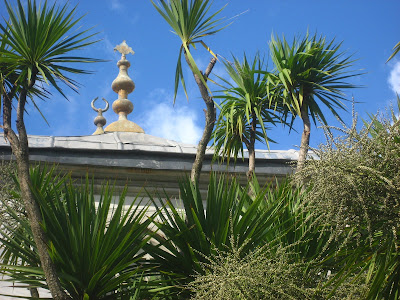
Thought it was time to post some more photos. It was nice at the beginning of the week so I spent some time walking around outside and snapping photos of parts of the city I don't think I have captured yet. It was quite warm even after the sun went down, and I was very happy, but that warmth was shortlived, for a fog rolled in and brought real November weather back to us.
Can't say much has happened in the last week. I did get to sing Irish pub songs with some English guy along to a Bulgarian singer in a place called the Melon Bar. I was sort of tempted to go back to Spain with the guy and his buddy, as they are movers and drove here to transport furniture for someone who is moving here. It would have been fun to drive across Europe. But I stayed here, of course, here in Mother Bulgaria.
 Every time I think of "Mother Bulgaria" (seen here in the photo), the words "Mother Bulgaria jumped the gun" come into my head from The Beatles' Happiness is a Warm Gun. I can't help it; it just happens.
Every time I think of "Mother Bulgaria" (seen here in the photo), the words "Mother Bulgaria jumped the gun" come into my head from The Beatles' Happiness is a Warm Gun. I can't help it; it just happens.Anyway, you can see the fortress in the distance. The fortress is actually fake, though it is the city's biggest tourist attraction. In the 70s the Soviets decided to build some walls on top of the old fortress site, not bothering to consult historians or research how the old fortress actually was. There are a few things that are genuine, but they're all in ruins. The church that sits atop the hill was reconstructed in 1981 and painted in 1985. I am one of the few people who likes the paintings, I think. The same scenes you will find in any old Bulgarian church (St. George slaying the dragon, St. Dimitrius slaying the villian, St. Lazarus rising from the dead) have been painted on the walls but in a modern style. I took some photos awhile ago but they're on my other memory card
 Here's a "tourist attraction," but I can't figure out why. They say it is a good example of architecture from the post-Ottoman renaissance period but really I think they're just amused by the fact it has a statue of a monkey on it. Indeed, they call it "The House with the Monkey." But the city is weird like that. All tourism is weird like that, really. I mean, the city has built this whole fake renaissance street, complete with copper makers and other nineteenth century artisans. It's like a Turnovo Disneyland or something, you know, It's a Small World, blah blah blah. Thousands of tiny trinkets and junk no one needs is there for tourist dollars, euros, pounds, and leva. There is a tourist restaurant up there I've been tempted to go into for some fish and chips, but I imagine they charge tourist prices, too. We have these kinds of things all over the U.S. - pioneer towns and colonial towns and the like, so it's not like this is a unique thing, and it does get to show you what things were like back in the day.
Here's a "tourist attraction," but I can't figure out why. They say it is a good example of architecture from the post-Ottoman renaissance period but really I think they're just amused by the fact it has a statue of a monkey on it. Indeed, they call it "The House with the Monkey." But the city is weird like that. All tourism is weird like that, really. I mean, the city has built this whole fake renaissance street, complete with copper makers and other nineteenth century artisans. It's like a Turnovo Disneyland or something, you know, It's a Small World, blah blah blah. Thousands of tiny trinkets and junk no one needs is there for tourist dollars, euros, pounds, and leva. There is a tourist restaurant up there I've been tempted to go into for some fish and chips, but I imagine they charge tourist prices, too. We have these kinds of things all over the U.S. - pioneer towns and colonial towns and the like, so it's not like this is a unique thing, and it does get to show you what things were like back in the day.Anyway, here are some photos of the tourist village. The monkey's in there, too.




















